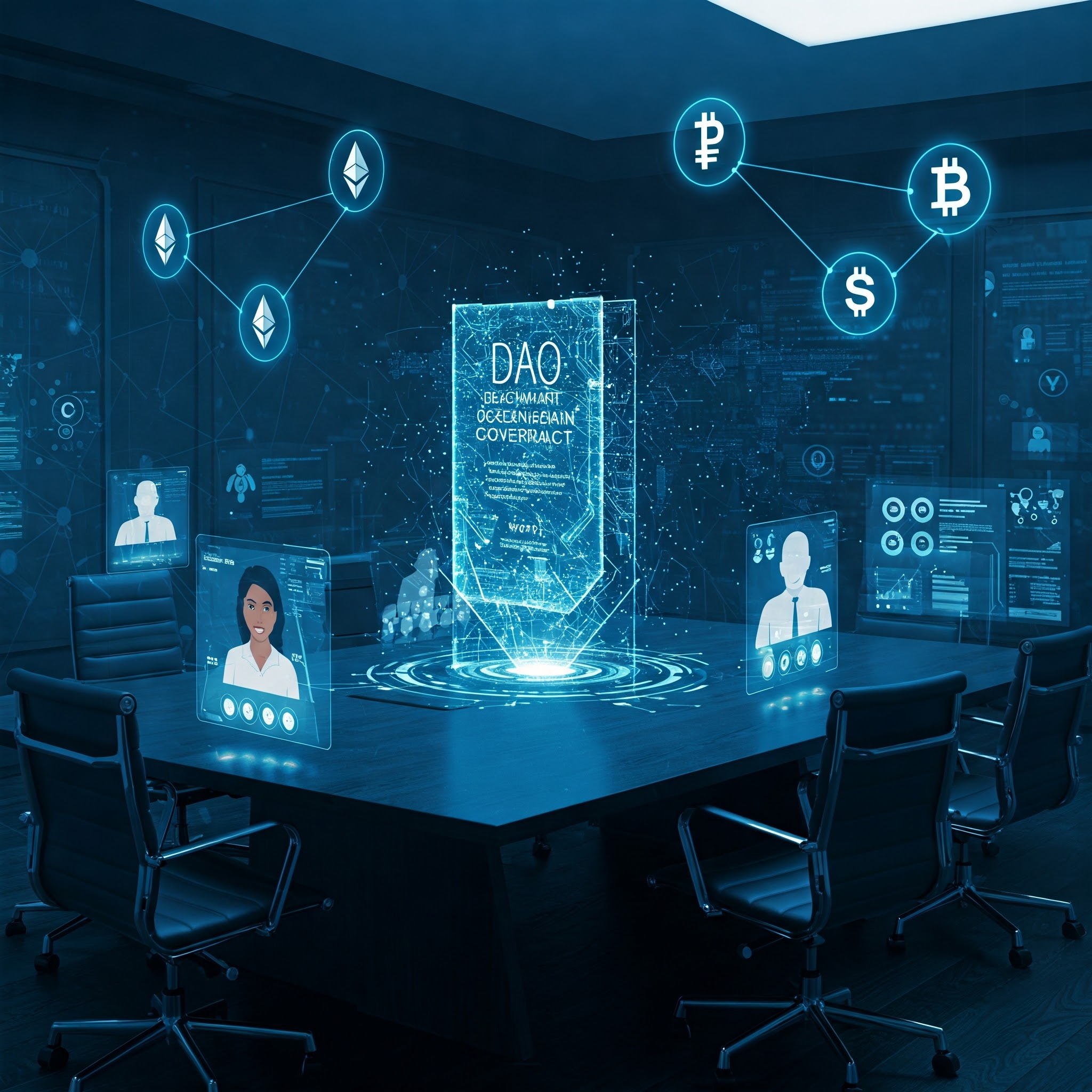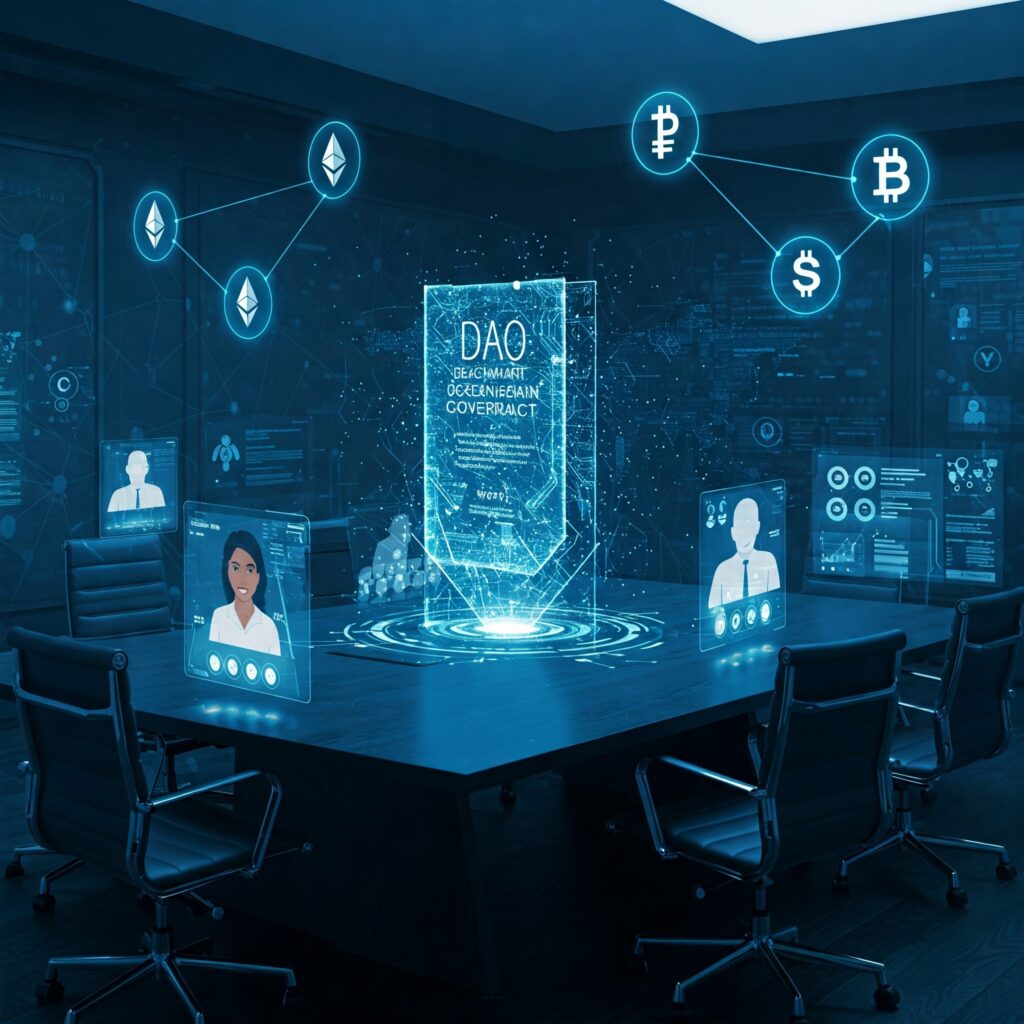What Are DAOs? A Beginner’s Guide to Decentralized Autonomous Organizations

Introduction
Have you ever imagined a company running without a CEO or a traditional board of directors? That’s exactly what DAOs (Decentralized Autonomous Organizations) aim to achieve. They function without centralized leadership, relying on blockchain technology and smart contracts to operate autonomously.
With the rise of cryptocurrencies and blockchain innovation, DAOs have gained significant attention as a new way to organize businesses, communities, and investments. But what exactly are DAOs, and how do they work? This article will explain everything in simple terms, helping you understand how they are changing the way organizations function.

Understanding the Topic
What is a DAO?
A DAO, or Decentralized Autonomous Organization, is a type of organization that operates through smart contracts on a blockchain. Instead of being controlled by a single entity, DAOs are governed by their members, who make decisions through a voting system.
In simple words, think of a DAO as an online community with a shared bank account. Every decision, from spending funds to approving new projects, is made collectively, following predefined rules in smart contracts.
Why Are DAOs Important?
DAOs eliminate the need for traditional management structures, reducing bureaucracy and increasing transparency. They ensure that decisions are made democratically, with every member having a say. This can be particularly useful in investment clubs, nonprofit organizations, and even social communities.
Real-World Examples of DAOs
- The DAO (2016): One of the first DAOs, it was an investment fund but collapsed due to a security flaw.
- MakerDAO: A DAO responsible for the stablecoin DAI, used in DeFi applications.
- Uniswap: A decentralized exchange governed by its community.
- Friends with Benefits (FWB): A social DAO where members pay to join an exclusive community.
Key Benefits / Advantages of DAOs
1. Decentralization & Transparency
DAOs run on blockchain, meaning all transactions and decisions are recorded publicly. This transparency reduces corruption and increases trust.
2. Democratic Decision-Making
Unlike traditional companies, where executives make key decisions, DAOs allow all members to vote on proposals, ensuring a fairer decision-making process.
3. Automation & Efficiency
Smart contracts execute rules automatically, removing the need for intermediaries and making processes faster and more efficient.
4. Global Accessibility
Anyone with an internet connection can participate in a DAO, making it a truly global and inclusive organization model.
5. Incentive Structures
Most DAOs use tokens to reward members for participation, ensuring engagement and alignment of interests.
Step-by-Step Guide / How-To Get Involved in a DAO
Step 1: Choose a DAO That Interests You
DAOs exist in various fields like finance, gaming, social networking, and charity. Research and find one that aligns with your interests.
Step 2: Get a Crypto Wallet
To participate, you need a digital wallet like MetaMask or Trust Wallet, which allows you to store and interact with DAO tokens.
Step 3: Buy or Earn DAO Tokens
Most DAOs require you to hold their governance tokens to participate in decision-making. You can buy them on crypto exchanges or earn them through contributions.
Step 4: Join the Community
Engage with the DAO’s community via platforms like Discord, Telegram, or their official forums to stay updated on proposals and discussions.
Step 5: Vote on Proposals
Once you hold DAO tokens, you can vote on proposals that shape the future of the organization. The more tokens you have, the greater your voting power.
Expert Tips:
- Start with well-known DAOs to minimize risks.
- Read smart contracts before investing.
- Stay active in the community for better engagement.
Common Problems & Solutions
Problem 1: Security Risks
Solution: DAOs rely on smart contracts, which can have vulnerabilities. Always check if the DAO has undergone an audit by a reputable security firm.
Problem 2: Slow Decision-Making
Solution: Since voting takes time, decisions in DAOs can be slower than traditional companies. Clear rules and active member participation can speed up the process.
Problem 3: Low Participation
Solution: DAOs need active members to function effectively. Incentivizing participation through rewards and engagement campaigns can help.
Problem 4: Legal Uncertainty
Solution: Many countries do not have clear regulations for DAOs. If you are investing, make sure to understand the legal implications in your region.
Future Trends / What’s Next for DAOs?
1. Integration with AI & Automation
As artificial intelligence advances, DAOs may use AI to automate decision-making processes even further, reducing human errors and biases.
2. Government Adoption
Governments are exploring DAOs for governance and public services, which could lead to mainstream adoption.
3. Increased Institutional Interest
More businesses and investors are recognizing DAOs as a viable alternative to traditional corporate structures.
4. Cross-DAO Collaboration
DAOs will likely form partnerships, enabling seamless cooperation between different decentralized organizations.
Conclusion & Final Thoughts
DAOs represent a revolutionary way of organizing communities and businesses. They bring decentralization, transparency, and efficiency to decision-making processes. However, like any new technology, they come with risks and challenges.
If you are interested in DAOs, start by researching reputable projects, joining their communities, and participating in governance. As blockchain technology continues to evolve, DAOs could become a major part of our digital and financial future.
What do you think about DAOs? Are they the future of governance? Let us know in the comments below!
FAQ (Frequently Asked Questions)
1. What does DAO stand for?
DAO stands for Decentralized Autonomous Organization, which operates through blockchain and smart contracts without centralized leadership.
2. Are DAOs legal?
DAO regulations vary by country. Some jurisdictions recognize them, while others lack clear legal frameworks.
3. How do DAOs make money?
DAOs can generate revenue through investments, service fees, token appreciation, and partnerships.
4. Can anyone create a DAO?
Yes! With the right technical knowledge, anyone can create a DAO using blockchain platforms like Ethereum or Solana.
5. What are the risks of joining a DAO?
Risks include security vulnerabilities, regulatory uncertainty, and slow decision-making. Always do your research before investing in a DAO.